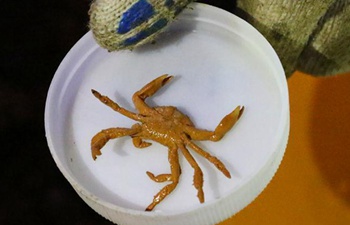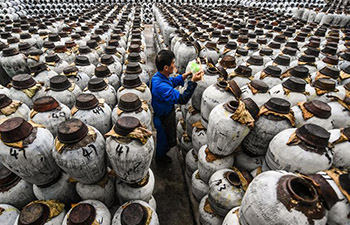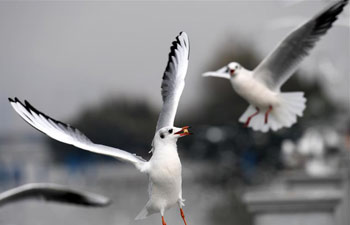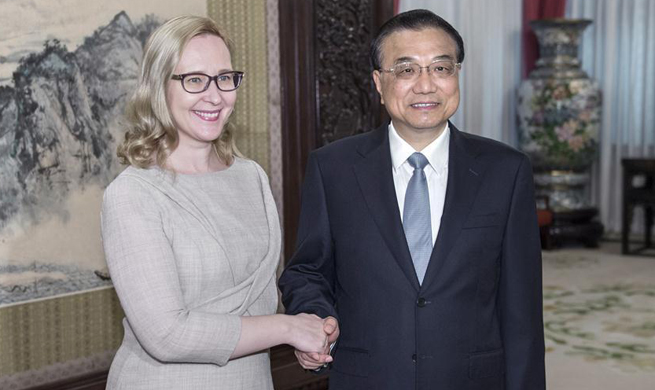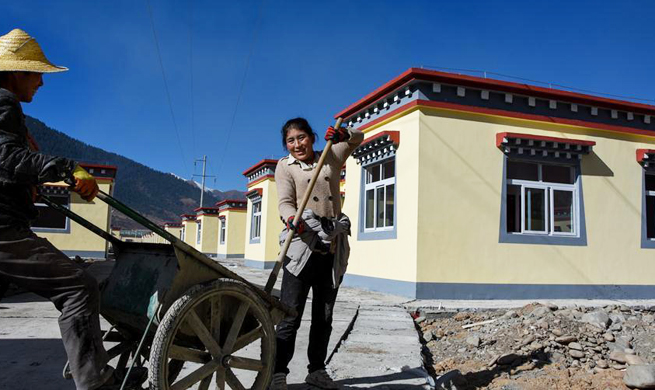by Xinhua writers Gao Pan, Yan Liang
WASHINGTON, Nov. 7 (Xinhua) -- China and the United States could seek cooperation in areas of infrastructure investment, cybersecurity and educational exchanges to keep the bilateral relationship on a positive track, a leading U.S. expert has said.
Under the Obama administration, cooperation on climate change between China and the United States "was very positive," said Adam Posen, president of the Peterson Institute for International Economics (PIIE), a Washington D.C.-based think tank.
"It allowed not only China and the U.S. to do some good in the world but to have a positive agenda together," Posen told Xinhua in a recent interview.
However, for the Trump administration, climate change is no longer a priority issue. The two countries have to find other positive things to work together to help anchor China-U.S. relations in the years ahead, the expert said.
"I would like to think maybe here is where the cultural stuff comes in," Posen said, suggesting the two countries could "build up educational exchanges" and get that back on track.
Meanwhile, there is more common ground between the United States and China in cybersecurity nowadays.
"China has interests in cybersecurity like the U.S. does, and the U.S., after what's happened with Facebook and others during our election, I think is more sympathetic to regulating some of these entities the way China already does," he said.
As the world's two largest economies, the United States and China also share a common interest in infrastructure investment. The Trump administration has pledged to upgrade U.S. aging infrastructure, while China has proposed the initiative on the construction of the Silk Road Economic Belt and the 21st Century Maritime Silk Road (the Belt and Road Initiative) to strengthen regional inter-connectivity through infrastructure development.
"There is a general need in the world for more infrastructure investment," Posen said, adding it is "a good idea" for China and the United States to cooperate in areas of infrastructure spending and multilateral development banks.
In terms of the four high-level dialogue mechanisms established between China and the United States in April, Posen said it signals the continuity of the formal dialogue process, which is more important than what is in the tracks.
"It meant that the leaders from China and U.S. would get together, have an agenda peaceful, and be in regular contact," he said, adding "we can hope for something good" as long as there is a formal dialogue process.
While the U.S. and Chinese business communities have called for the two governments to resume negotiations on a bilateral investment treaty, Posen said that is not a priority for the Trump administration, which has wrongly focused on the bilateral trade deficits.
However, "it's in the U.S. interests" to have a bilateral investment treaty with China, he noted, expressing regret that both sides were unable to conclude a deal under the previous U.S. administration.
In terms of steel overcapacity, Posen said it is a global issue and "not so much a U.S.-China issue," as the Obama administration had already taken actions to protect the U.S. steel industry from Chinese imports.
Currently, the United States basically imports almost no steel from China and the U.S. industry faces competition from South Korea, India and Europe.
"So what we really need is a global solution to take down the amount of steel overcapacity around the world," he said.
Speaking of the recently-concluded 19th National Congress of the Communist Party of China (CPC), Posen said he was "watching very carefully what President Xi and what the party Congress chose to emphasize and the sort of broad picture of a modernized socialist economy."
In his view, it was "very wise" for China to elevate the Belt and Road Initiative to a principled long-term policy, place emphasis on domestic financial stability, and talk more broadly about people's well-being including environment rather than specific numerical growth targets.
Compared with most Westerners, Posen said experts at the PIIE have recently been optimistic on China's economy.
"In 2015 and 2016, we kept telling people it's (China's economy) not going to crash, growth is stronger, the financial system is not that fragile, and that was right," he said.
But he also pointed out that China has problems of a slowdown in productivity growth and a waste of capital in the less productive state-owned enterprises, particularly in some old industries.
"The share of credit in the last two or three years going to the state-owned enterprises has been going up, and the share going to the private sector is going down again. This is not dangerous but it's wasteful," he said.




